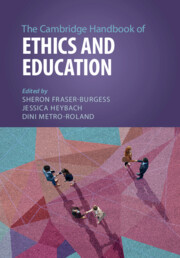Book contents
- The Cambridge Handbook of Ethics and Education
- The Cambridge Handbook of Ethics and Education
- Copyright page
- Epigraph
- Contents
- Figures
- Tables
- Contributors
- Foreword
- Preface
- Acknowledgments
- Part I Traditions in Ethics and Education
- 1 Ancient Chinese Ethics and Education
- 2 Ancient Greek and Roman Ethics and Education
- 3 Ubuntu Ethics and Education in Southern Africa
- 4 Ethical and Environmental Knowledge and Education
- 5 Ethics, Education, and the Inheritance of Abraham
- 6 Prioritizing Outcomes
- 7 Freedom and the Ethics of Educational Authority
- 8 Moral Education in the Virtues
- 9 The Ethics of Bildung and Liberal Education
- 10 American Pragmatism, Democratic Ethics, and Education
- 11 Radical Ethics
- 12 The Ethics of Phenomenology and Hermeneutics in Education
- 13 Feminist Ethics and the Contradictions of Gender
- 14 Postmodern/Poststructuralist Ethics and Education
- Part II Ethics and Education in Practice
- Part III Emerging Ethical Pathways and Frameworks
- Index
- References
11 - Radical Ethics
Marxism and Habermasian Critical Theory
from Part I - Traditions in Ethics and Education
Published online by Cambridge University Press: 07 March 2024
- The Cambridge Handbook of Ethics and Education
- The Cambridge Handbook of Ethics and Education
- Copyright page
- Epigraph
- Contents
- Figures
- Tables
- Contributors
- Foreword
- Preface
- Acknowledgments
- Part I Traditions in Ethics and Education
- 1 Ancient Chinese Ethics and Education
- 2 Ancient Greek and Roman Ethics and Education
- 3 Ubuntu Ethics and Education in Southern Africa
- 4 Ethical and Environmental Knowledge and Education
- 5 Ethics, Education, and the Inheritance of Abraham
- 6 Prioritizing Outcomes
- 7 Freedom and the Ethics of Educational Authority
- 8 Moral Education in the Virtues
- 9 The Ethics of Bildung and Liberal Education
- 10 American Pragmatism, Democratic Ethics, and Education
- 11 Radical Ethics
- 12 The Ethics of Phenomenology and Hermeneutics in Education
- 13 Feminist Ethics and the Contradictions of Gender
- 14 Postmodern/Poststructuralist Ethics and Education
- Part II Ethics and Education in Practice
- Part III Emerging Ethical Pathways and Frameworks
- Index
- References
Summary
The radical ethics of critical theory, from Marx to Habermas, proposes principles through which ethical deliberations might be pursued. The radical nature of Habermas’s ethics involves a recognition of “the other” as worthy and valid in their own right. Such radical openness to others has the potential of transforming us toward what is better. When an individual’s conception of the good life necessitates an awareness and orientation toward what is good for “others,” ethics converges with the moral point of view through what is just: the good life as synonymous with just living. The chapter begins with a compelling story of a Ugandan peaceworker through which the authors draw out critical ethical principles. Then, the authors apply the radical ethics of Habermas’s critical theory to the contemporary US policy discourse around trans athletes’ participation in school sports. That discourse is analyzed according the principles introduced through the story at the beginning of the chapter.
- Type
- Chapter
- Information
- The Cambridge Handbook of Ethics and Education , pp. 213 - 236Publisher: Cambridge University PressPrint publication year: 2024
References
- 1
- Cited by

